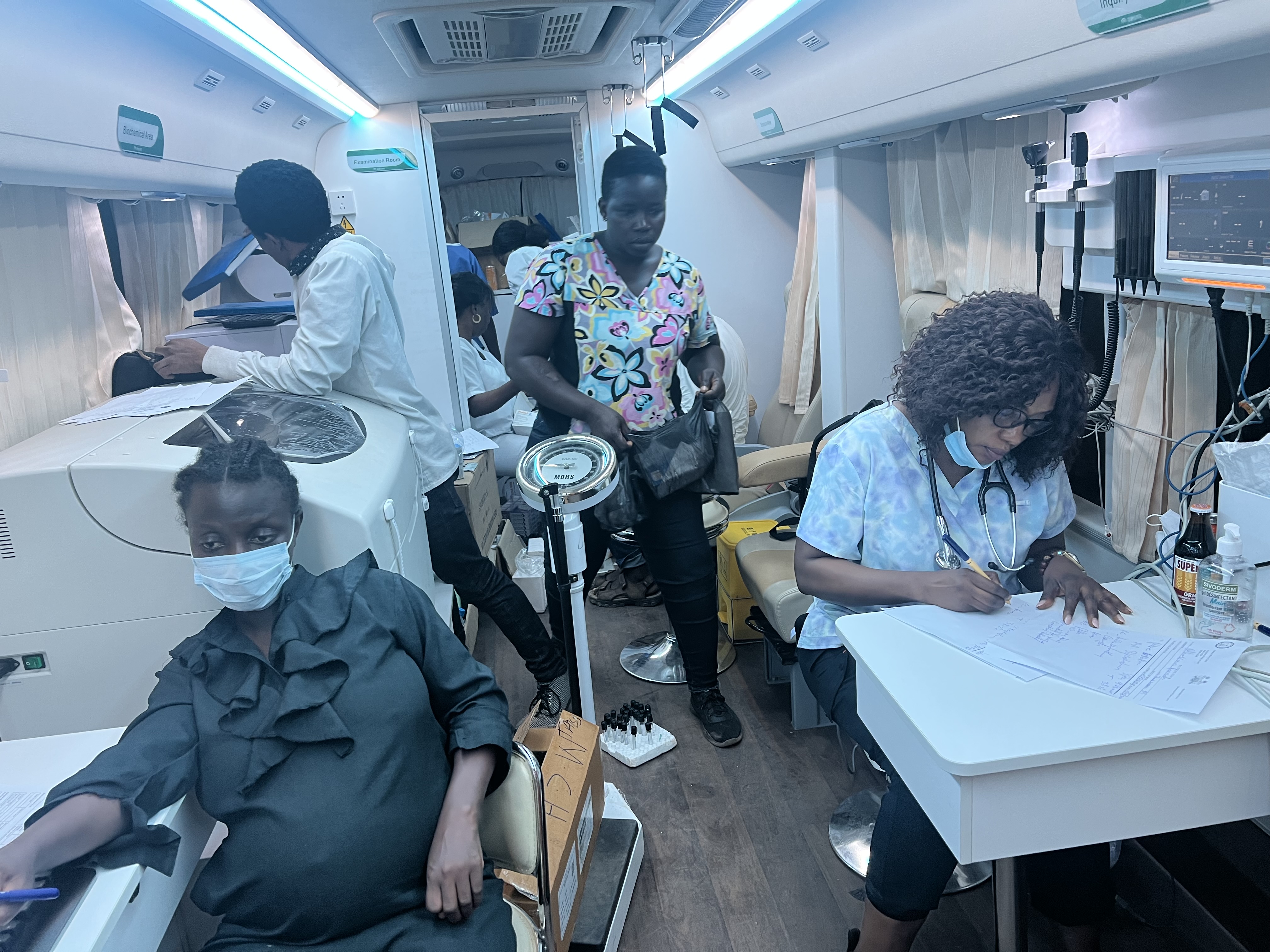Mobile Clinics Bridge Healthcare Gaps in Sierra Leone

China donated four mobile health clinic buses to help enhance medical services in remote areas of Sierra Leone. (Provided to S&T Daily)
By LIANG Yilian
In Bawuma Kailun village in Sierra Leone, 10-year-old Lucinda Dott Davvys is taken to a mobile health clinic by her family. Her face is clouded in anxiety and pain, as she suffers in silence. The medical team gently check her serious leg fracture which is close to necrosis. Yet despite this traumatic situation, if it weren't for the free medical treatment, her family might not have considered taking her to hospital.
In many villages across Sierra Leone, a small country on the southwest coast of West Africa, tragic scenes like this of people enduring illness or injury are common for locals.
For many, they will never pay a visit to a hospital in their lives, not because they remain healthy or injury free, but due to an inability to afford treatment costs. Compared with many, this young girl was fortunate. She was transferred to a major hospital thanks to the staff on the mobile health clinic, which ultimately saved her leg from amputation.
In 2018, the then Minister of Science and Technology Wang Zhigang, as a special envoy of President Xi Jinping, pledged to donate four mobile health clinic buses to help enhance medical services in remote areas of Sierra Leone. Due to the COVID-19 pandemic, the buses arrived in the country in 2021. The mobile health clinic service that helped the young girl, was one of these.
Hospital on wheels
These mobile health clinics are equipped with portable diagnostic tools, capable of testing for blood, urine, liver and kidney maladies, electrocardiograms, ENT disease diagnostics, and trauma emergency kits.
Xia Yinyin, a Chinese diplomat in Sierra Leone in charge of health and technology affairs told Science and technology Daily, "The ICU, trauma treatment room, ENT department examination room, cold storage for vaccine agents, and data recording room are all integrated within the vehicle."
Sierra Leone, one of the world's least developed countries, suffers from a severe lack of healthcare resources.
"Apart from six relatively large hospitals in Sierra Leone, the country mostly has small clinics, many of which can only provide limited health care such as herbal treatments. When people get sick, they tend to endure the pain, as they can't afford the travel and treatment expenses to see a doctor," said Xia.
On March 7, 2022, Sierra Leonean President Julius Maada Bio officially launched the Hospital on Wheels project. Based on four mobile medical vehicles, the project encompasses infectious disease diagnosis and treatment, maternal and child healthcare, vaccinations, and other services. Its mission is to provide diagnostic and treatment services in remote areas.
During his meeting with China's then ambassador to Sierra Leone, Hu Zhangliang, President Bio hailed the project as "one of the best initiatives Sierra Leone [has] ever had."
Serving the people
To date, the four mobile health clinics have completed over 10 rounds of visits to remote villages and towns in different districts, attending to over 37,000 patients in total. Wherever they go, they are warmly received by local residents, with many queuing up to wait their turn deep in to the night for their encounter with modern medical facilities. The project addresses a critical gap in reaching vulnerable populations in remote areas of the country, according to Sierra Leone's Minister of Health and Sanitation Austin Demby.
"With the support of various international partners, the project offers free treatment for infectious diseases and has also greatly promoted vaccination efforts. This achievement is particularly noteworthy as Sierra Leone is one of only four African countries to achieve 70 percent coverage of COVID-19 vaccines," said Xia.
Through mobile health services, healthcare workers have also identified previously overlooked health issues and the needs of specific groups. For example, over half of the pregnant women seeking services had never undergone prenatal examinations.
"Period poverty" is another big challenge, which affects many women across Africa who cannot afford sanitary pads, said Xia, adding that "This mobile medical service also provides free sanitary pads for women and children in remote areas, in addition to offering reproductive health consultations."
Medical help for international events
Furthermore, the mobile health clinics ensure the provision of immediate checks and basic treatment during major international and national conferences in Sierra Leone. From June 3 to 9, 2022, the Commonwealth Parliamentary Association (Africa Region) Conference was held in Sierra Leone, with about 300 parliamentary representatives from 63 member countries in attendance. Given the relatively advanced age of the representatives, mobile medical units were dispatched to provide on-the-spot checks and simple treatments where needed,to safeguard their health. Approximately 150 individuals received health check-ups, with 10 being referred to hospitals.
The mobile health clinics assistance project for Sierra Leone is a prime example of China's "small but beautiful" projects. It not only brings high-quality diagnostic and treatment services with high-tech support to remote residents in Sierra Leone, but also plays an active role in deepening Sino-Sierra Leonean friendship.






